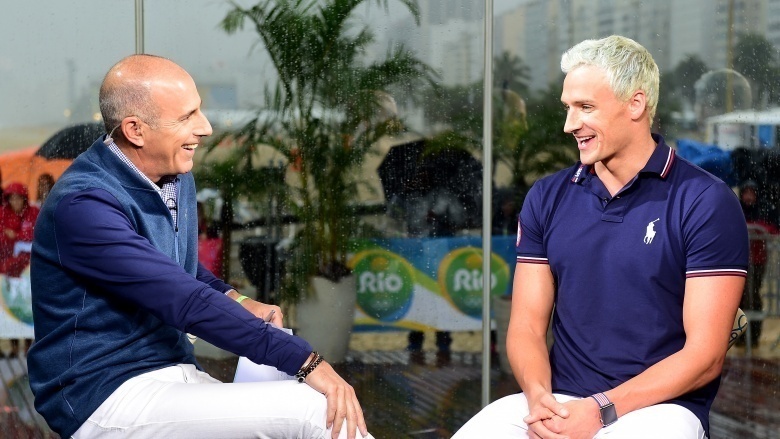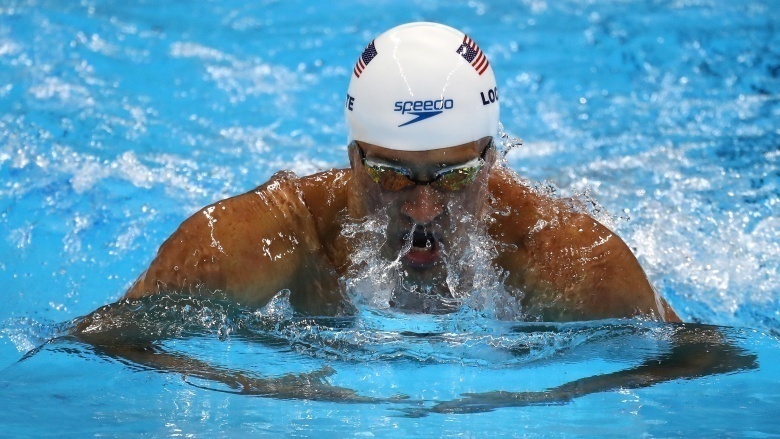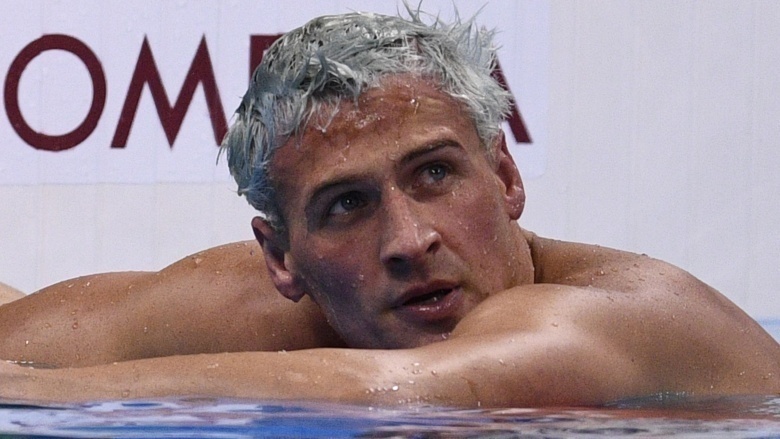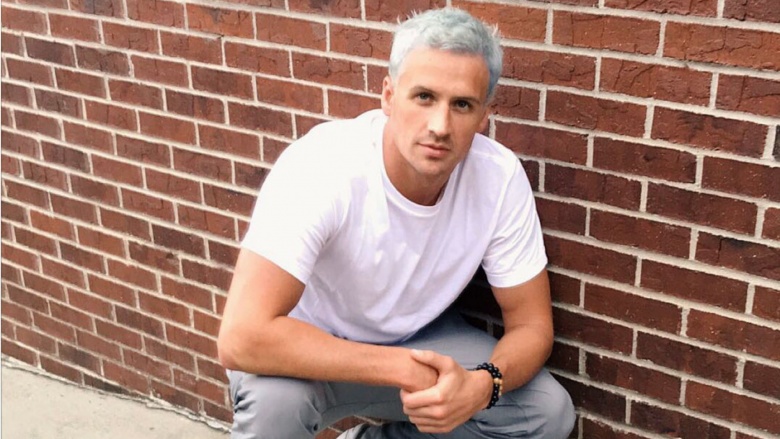What Really Happened To Ryan Lochte In Rio?
U.S. Olympic swimmer Ryan Lochte shocked the world when he revealed that he had been robbed at gunpoint by men pretending to be police officers during the Games in Rio de Janeiro, Brazil. But jaws hit the floor when authorities called into question the veracity of the decorated athlete's claims. What really went down in Rio?
Lochte describes a scary scene
Initially, the International Olympic Committee (IOC) denied the buzz that Lochte and three of his teammates had been held up at gunpoint, and Lochte himself did not immediately tell authorities about the incident for fear that they'd "get in trouble" for...something. Soon after, the U.S. Olympic Committee (USOC) released a statement confirming that Lochte and fellow American swimmers Gunnar Bentz, Jack Conger, and Jimmy Feigen were held up with a deadly weapon after leaving a party in a cab on Aug. 13, 2016.
Lochte later elaborated in an interview with NBC News that their taxi was stopped by a group of individuals wielding a police badge. "They pulled out their guns, they told the other swimmers to get down on the ground—they got down on the ground. I refused. I was like, 'We didn't do anything wrong, so I'm not getting down on the ground,'" he said. The situation escalated and Lochte said one of the assailants cocked the weapon and put it to his forehead. "I put my hands up, I was like, 'Whatever.' He took our money, took my wallet—he left my cell phone, he left my credentials." Lochte also thanked fans for their support and expressed his gratitude that he and his teammates walked away unscathed.
At least one of his teammates seems to support his story
Slight contradictions surface
Investigators felt there were some discrepancies in the statements given by Lochte and Feigen. For example, Lochte reportedly mentioned just one robber to police, while Feigen said there were several men involved. There were also timeline inconsistencies. The swimmers told authorities they left the club around 4 a.m., but security cameras showed them leaving at 5:50 a.m. and returning to the Olympic Village at 6:56 a.m., according to The New York Times.
The swimmers' demeanor raises some eyebrows
Officials were reportedly bothered by the guys' calm composure upon returning to the Olympic Village after the alleged robbery. As revealed in a surveillance video from the site, when Lochte and company returned to their lodging, they casually dropped their various pocket items into the bins for inspection and did not appear to be visibly shaken, even making playful gestures to one another at some points. A local prosecutor said in a statement (via the Daily Mail), "one sees that the supposed victims arrived with their physical and psychological integrity intact, even playing with each other, showing that there wasn't any psychological shock inherent to such alleged violence." It was fishy enough for officials to dive deeper into the truthfulness of the tale.
Video at Olympic Village somewhat confirms Lochte's account
In security footage of the swimmers returning to the Olympic Village after their alleged robbery, Ryan Lochte is seen setting down his credential lanyard (which he had said was not stolen) and another shiny dark object (which may be the phone he also said was not stolen). Unlike some of his friends, Lochte does not appear to have his wallet with him. Considering his allegation that his wallet and money were taken, that footage may support some elements of Lochte's story.
A judicial order is issued against the swimmers
Judge Kayla Blanc de Cnop ordered Lochte and Feigen to remain in Rio, even issuing a search and seizure warrant for their passports, but like many of their competitors in the pool, the medalists were too fast. When police arrived to question the swimmers, they were already gone from their quarters. A rep for the USOC confirmed in a statement, "the swim team moved out of the village after their competition ended, so we were not able to make the athletes available."
While Lochte reportedly left the country before the order, Feigen was still in Brazil at the time. He confirmed to USA Today, "I'm just trying to give Brazil what they want and get out of here. It's a hassle, but I'm safe. Everything's fine." Teammates Bentz and Conger, who had previously given statements to police, were reportedly removed from their departing flight to the United States by Brazilian authorities on Aug. 17, 2016 so they could be questioned. "They were released by local authorities with the understanding that they would continue their discussions about the incident on [Aug. 18, 2016]," the USOC said in a statement (via The Washington Post).
Lochte's stands by his story
In a statement to NBC News, Lochte's lawyer, Jeff Ostrow, said the swimmer's statement to police was honest and supervised by a litany of legal experts, including reps from the USOC, the U.S. State Department, and the FBI. Ostrow noted that Lochte had not been asked to stay in the country before the order, so there was no reason for him to stick around after his events were over. Ostrow claimed Brazilian authorities were merely trying to "save face" after the media "circus" that followed the reports.
Brazilian police call the swimmers liars
Brazilian police claim that a second bit of video evidence further negates the aquatic quartet's robbery story. New surveillance footage shows the group exiting a gas station, entering a taxi cab, then exiting the cab with their hands up while being confronted by others and made to sit on the sidewalk. Authorities told ABC News they believe the video shows the group arguing with security after one of the swimmers allegedly damaged a door in the gas station's bathroom. According to police, the swimmers offered to compensate the clerk for the damage with 20 bucks and 100 Brazilian reals (the equivalent of about $30).
Per NBC News, after returning to the United States ahead of his teammates, Lochte elaborated on his previous account of the allegedy robbery, saying that they were indeed at a gas station and did try to leave in a taxi, but Lochte insisted they were stopped by armed robbers with police badges who forced them to the ground and stole their money.
According to The New York Times, Brazilian police officials say "there was no robbery in the way it was reported by the athletes," adding that the swimmers stained the city's reputation with "a fantastical vision."
The teammates finally talk
After being removed from their flight before it could depart for the United States, Conger and Bentz talked to Brazilian police on Aug. 18. According to the Associated Press, the two told authorities the robbery story originally reported by Lochte and Feigen was fabricated to cover for the athletes' vandalism of the gas station bathroom. Police said the swimmers broke a door, a soap dispenser, and a mirror, and tore down a sign.
Police initially said no firearms were drawn as security guards confronted the group, but the AP reported that a Brazilian law enforcement official confirmed the guards did draw their weapons during the dispute. Brazilian officials have recommended the swimmers be charged with falsely reporting a crime.
According to ABC News, Bentz and Conger were cleared to fly home; Feigen agreed to pay $11,000 to a charity in exchange for the return of his passport. Lochte's attorney released a statement saying, "No matter what happened at that gas station, the swimmers were robbed by people with a gun appearing to be law enforcement. No matter what country you are in that is robbery and robbery is a serious crime."
Lochte finally apologizes
After tireless investigations proved his story did not hold water, and after the USOC offered Brazilian authorities an official apology, Ryan Lochte finally came forward with his own acknowledgment of the trouble that his report caused Rio, his teammates, and the Olympics-loving world at large. In a statement on Instagram posted Aug. 19, 2016, the swimmer said he was sorry "for not being more careful and candid" in his description of events and for "taking the focus away from the many athletes fulfilling their dreams of participating in the Olympics."
Lochte didn't go so far as to admit to lying about the incident. Instead, he wrote, "It's traumatic to be out late with your friends in a foreign country—with a language barrier—and have a stranger point a gun at you and demand money to let you leave."
He did acknowledge that he had acted irresponsibly. "I accept responsibility for my role in this happening and have learned some valuable lessons," he wrote. Lochte said that he waited to share this apology until he was sure that his three teammates would return safely from Rio.










